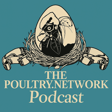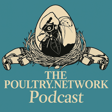
E11 Graham Atkinson: Building Fairer, Smarter Egg Supply Agreements
In this episode of the Poultry Network Podcast, hosts Tom Willings and Tom Woolman welcome Graham Atkinson, an experienced poultry professional who recently founded Grange Consultancy after nearly three decades in the sector, including 14 years at Noble Foods.
The conversation begins with talk of Yorkshire weather before turning to Graham’s transition from corporate employment to independent consultancy.
He reflects on the nerves of setting up on his own but explains how a “varied diet” of work – spanning data, technology, health and welfare, pharmaceuticals, writing, and increasingly direct work with producers – has kept him busy and engaged.
The core focus of the discussion is on egg supply contracts – a subject Graham has been exploring through his work and in a recent article in The Ranger magazine.
The hosts and guest dig into what makes a good contract, why producers should pay closer attention to detail, and how contracts can balance fairness for both producers and packers.
Graham notes that today’s strong producer margins are historically unusual and unlikely to last indefinitely.
Many farmers, he says, underestimate or misunderstand the small print of contracts.
Some have traditionally relied on trust-based relationships without formal agreements, while others sign documents without fully grasping their obligations.
Both situations can leave producers exposed when market conditions change.
The podcast explores specific contract components:
- Egg supply agreements vs. pricing terms – often handled in separate documents, which can create confusion.
- Force majeure clauses – usually vaguely drafted; Graham argues for clearer definitions, including explicit reference to avian influenza.
- Price adjustment mechanisms – highlighted as the most contentious element of any deal. The team stress the importance of transparency over when and how prices move.
One major development has been the use of the ADAS cost of production model, pioneered by BFREPA.
This independent reference point has been increasingly incorporated into contracts, giving producers and packers a clear, mutually agreed basis for pricing.
Graham welcomes this as a step forward, though he cautions that adoption remains patchy.
The discussion also touches on wider market dynamics. The hosts argue that while cost-of-production models provide fairness, there must still be space for diversity: different farms with different business models will inevitably need different contractual terms.
Spot markets will continue to play a role, as not every producer will opt for (or be offered) a long-term cost-linked agreement.
Looking ahead, the panel link these debates to the DEFRA Fairness in the Supply Chain Review, which outlines a potential code of practice for farm-gate contracts.
Government is pushing for greater transparency from buyers, particularly around price changes – a demand that could be very difficult for packers to meet given the complexity of their operations and customer mix.
As the episode closes, Graham offers his advice to farmers:
- Read your contract in detail – don’t assume you know what it says.
- Seek advice on unclear clauses.
- Look beyond today’s price – focus on how price is structured and adjusted.
- Clarify protections around force majeure and other critical risks.
- Work with packers as partners to create agreements both sides can sustain.
The conversation underscores that contracts are not just paperwork but the foundation of long-term, resilient relationships across the egg supply chain.

